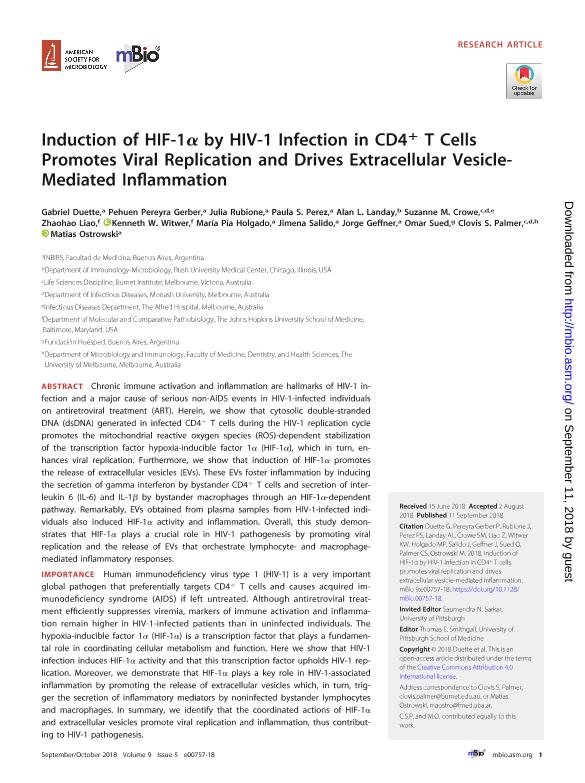Artículo
Induction of HIF-1α by HIV-1 infection in CD4 + T cells promotes viral replication and drives extracellular vesicle-mediated inflammation
Duette, Gabriel ; Pereyra Gerber, Federico Pehuén
; Pereyra Gerber, Federico Pehuén ; Rubione, Julia
; Rubione, Julia ; Pérez, Paula Soledad
; Pérez, Paula Soledad ; Landay, Alan L.; Crowe, Suzanne M.; Liao, Zhaohao; Witwer, Kenneth W.; Holgado, María Pía
; Landay, Alan L.; Crowe, Suzanne M.; Liao, Zhaohao; Witwer, Kenneth W.; Holgado, María Pía ; Salido, Jimena Patricia
; Salido, Jimena Patricia ; Geffner, Jorge Raúl
; Geffner, Jorge Raúl ; Sued, Omar Gustavo; Palmer, Clovis S.; Ostrowski, Matias
; Sued, Omar Gustavo; Palmer, Clovis S.; Ostrowski, Matias
 ; Pereyra Gerber, Federico Pehuén
; Pereyra Gerber, Federico Pehuén ; Rubione, Julia
; Rubione, Julia ; Pérez, Paula Soledad
; Pérez, Paula Soledad ; Landay, Alan L.; Crowe, Suzanne M.; Liao, Zhaohao; Witwer, Kenneth W.; Holgado, María Pía
; Landay, Alan L.; Crowe, Suzanne M.; Liao, Zhaohao; Witwer, Kenneth W.; Holgado, María Pía ; Salido, Jimena Patricia
; Salido, Jimena Patricia ; Geffner, Jorge Raúl
; Geffner, Jorge Raúl ; Sued, Omar Gustavo; Palmer, Clovis S.; Ostrowski, Matias
; Sued, Omar Gustavo; Palmer, Clovis S.; Ostrowski, Matias
Fecha de publicación:
09/2018
Editorial:
American Society for Microbiology
Revista:
mBio
ISSN:
2161-2129
e-ISSN:
2150-7511
Idioma:
Inglés
Tipo de recurso:
Artículo publicado
Clasificación temática:
Resumen
Chronic immune activation and inflammation are hallmarks of HIV-1 infection and a major cause of serious non-AIDS events in HIV-1-infected individuals on antiretroviral treatment (ART). Herein, we show that cytosolic double-stranded DNA (dsDNA) generated in infected CD4 + T cells during the HIV-1 replication cycle promotes the mitochondrial reactive oxygen species (ROS)-dependent stabilization of the transcription factor hypoxia-inducible factor 1α (HIF-1α), which in turn, enhances viral replication. Furthermore, we show that induction of HIF-1α promotes the release of extracellular vesicles (EVs). These EVs foster inflammation by inducing the secretion of gamma interferon by bystander CD4 + T cells and secretion of interleukin 6 (IL-6) and IL-1β by bystander macrophages through an HIF-1α-dependent pathway. Remarkably, EVs obtained from plasma samples from HIV-1-infected individuals also induced HIF-1α activity and inflammation. Overall, this study demonstrates that HIF-1α plays a crucial role in HIV-1 pathogenesis by promoting viral replication and the release of EVs that orchestrate lymphocyte-and macrophage-mediated inflammatory responses. IMPORTANCE Human immunodeficiency virus type 1 (HIV-1) is a very important global pathogen that preferentially targets CD4 + T cells and causes acquired immunodeficiency syndrome (AIDS) if left untreated. Although antiretroviral treatment efficiently suppresses viremia, markers of immune activation and inflammation remain higher in HIV-1-infected patients than in uninfected individuals. The hypoxia-inducible factor 1α (HIF-1α) is a transcription factor that plays a fundamental role in coordinating cellular metabolism and function. Here we show that HIV-1 infection induces HIF-1α activity and that this transcription factor upholds HIV-1 replication. Moreover, we demonstrate that HIF-1α plays a key role in HIV-1-associated inflammation by promoting the release of extracellular vesicles which, in turn, trigger the secretion of inflammatory mediators by noninfected bystander lymphocytes and macrophages. In summary, we identify that the coordinated actions of HIF-1α and extracellular vesicles promote viral replication and inflammation, thus contributing to HIV-1 pathogenesis.
Archivos asociados
Licencia
Identificadores
Colecciones
Articulos(INBIRS)
Articulos de INSTITUTO DE INVESTIGACIONES BIOMEDICAS EN RETROVIRUS Y SIDA
Articulos de INSTITUTO DE INVESTIGACIONES BIOMEDICAS EN RETROVIRUS Y SIDA
Citación
Duette, Gabriel; Pereyra Gerber, Federico Pehuén; Rubione, Julia; Pérez, Paula Soledad; Landay, Alan L.; et al.; Induction of HIF-1α by HIV-1 infection in CD4 + T cells promotes viral replication and drives extracellular vesicle-mediated inflammation; American Society for Microbiology; mBio; 9; 5; 9-2018
Compartir
Altmétricas



